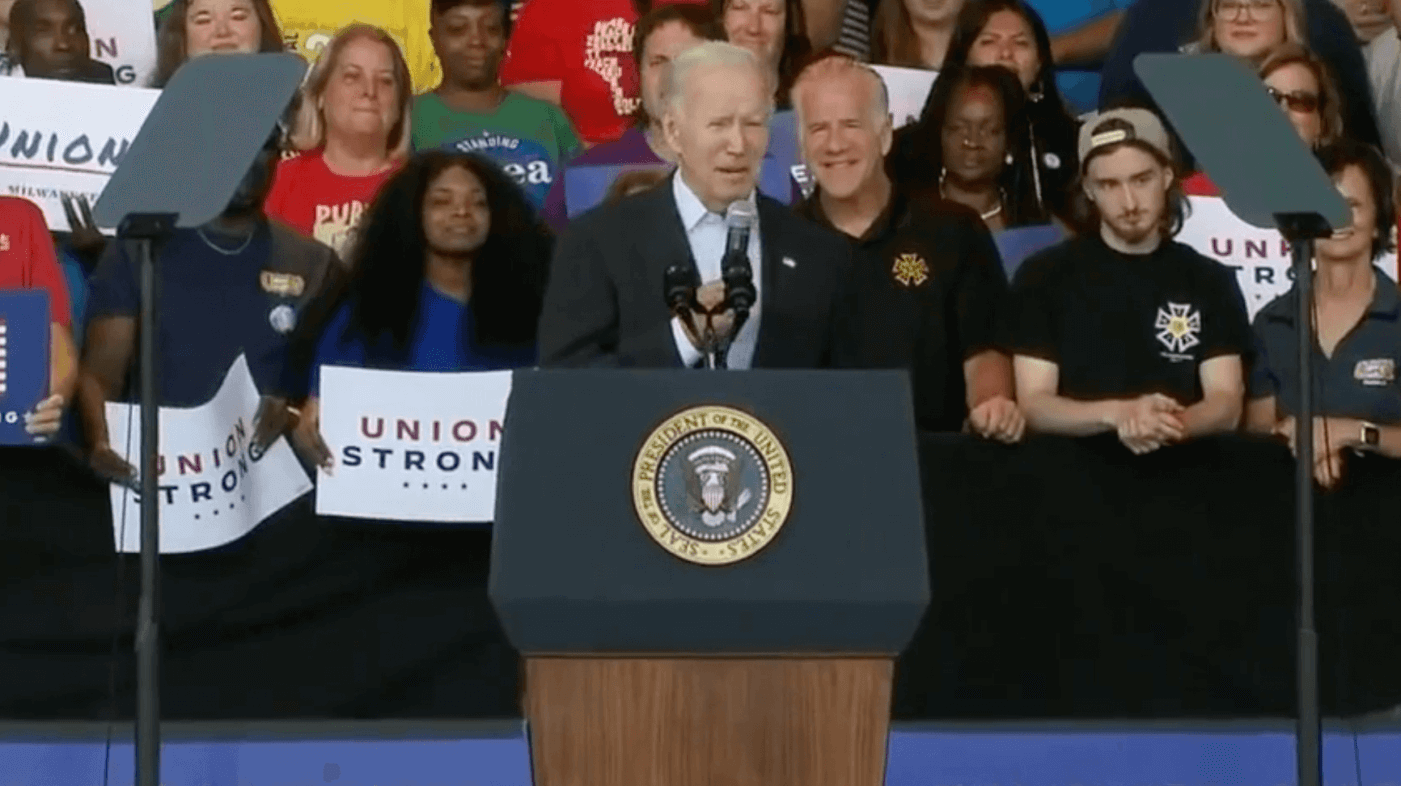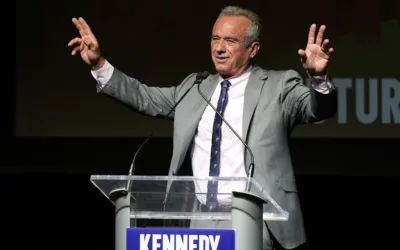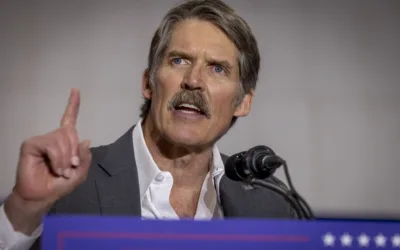
In the screen capture from pool video, President Joe Biden addresses Laborfest at the Summerfest grounds in Milwaukee on Sept. 5, 2022.
When President Joe Biden visits Milwaukee on Labor Day to talk about the value of union jobs—especially infrastructure jobs, Kent Miller will relate on multiple levels, having risen from a landscaper fresh out of high school to president of a labor council representing 9,000 infrastructure workers in Wisconsin.
Miller, the new president of the Wisconsin Laborers’ District Council, sees the value in what’s coming to the state because of the Bipartisan Infrastructure Law championed by Biden, who will speak at Laborfest at the Milwaukee Festival Grounds along with Gov. Tony Evers.
“This is a once in a lifetime investment,” said Miller. “We’re going to see in Wisconsin, probably an extra billion dollars over the next 5 years. That’s going to be anything from more roads and bridges, fixing our transportation infrastructure, the lead laterals, improving our water infrastructure, and broadband.”
Wisconsin will receive $1.5 billion in funding for projects to invest in roads and bridges, public transit, electric vehicle charging, clean energy and power, airports and ports, access to high-speed internet and clean water. The plan will also promote the creation of good-paying union jobs. By reaching communities across the state, including rural communities and historically underserved populations-the law makes critical investments that will improve lives for Wisconsinites and position the state for success.
Miller’s first landscaper job soon led to union positions in the sewer and water industry, where he spent the next eight years. His decision to get more involved in union administration was sparked by Evers’ predecessor.
“The Scott Walker administration came attacking unions,” Miller said. “That really got me more engaged, interested and being more active in my local union. I wanted to be a part of the process. That’s what unions are all about, workers collectively getting together and having a voice in the workplace, having a voice in working conditions, in training and other collective bargaining issues like our health care, and our retirement security.”
Miller then took on the role of marketing representative and organizer for the Great Lakes Region, an affiliation of the Laborers’ International Union of North America (LIUNA). Later, he was offered a position as assistant business manager of Wisconsin Laborers’ District Council, an affiliation of five Laborers’ locals in construction crafts. He recently became the president and business manager.
“I bleed orange,” said Miller of LIUNA. “That’s our branded colors.”
In 2015, Walker set out to weaken or eliminate union representation with measures such as Act 10 that all but eliminated public sector bargaining, and so-called “right-to-work” laws that further attacked labor in the private sector. But Miller is encouraged at the recent rebound of support for collective bargaining as a way to restore balance in an era of widening income gaps and restrictive working conditions.
“A recent Gallup poll said 71% of Americans support unions and organizing,” said Miller. “Hopefully that trend continues to grow, and we start seeing more people interested in forming and joining unions.”
The Bipartisan Infrastructure Investment and Job Act will create around 2 million jobs per year over the course of the decade. Funds through the law will be subject to Davis-Bacon requirements, which ensure that contractors pay workers on construction projects a fair, prevailing wage so that local wages, labor markets, and workers won’t be undercut.
The Bipartisan Infrastructure Law is investing $65 billion to provide affordable, high-speed internet to Americans. Wisconsin will receive a minimum allocation of at least $100 million to provide internet coverage across the state.
“We have a lot of rural areas in Wisconsin that don’t have quality access to the internet,” Miller said.
“This is also a time to grow our communities,” said Miller. “There’s a worker’s shortage and a lot of people don’t know about opportunities in the trades. This is an opportunity to get folks into apprenticeships, especially folks that have been overlooked in the trades over the years, so we’re talking, getting more women and people of color to participate in apprenticeships.”
For decades, infrastructure in Wisconsin has suffered from a systemic lack of investment. This is the largest long-term investment in Wisconsin’s infrastructure in a century.
“What a great opportunity and what a great bill, ” said Miller. “We’re excited. We will never see an investment like this in our generation again.”
This investment will grow the economy, create a path for success, as well as a better quality of life for Wisconsinites overall.

New Biden rules deliver automatic cash refunds for canceled flights, ban surprise fees
In the aftermath of a canceled or delayed flight, there’s nothing less appealing than spending hours on the phone waiting to speak with an airline...

One year on the Wienermobile: The life of a Wisconsin hotdogger
20,000+ miles. 16 states. 40+ cities. 12 months. Hotdogger Samantha Benish has been hard at work since graduating from the University of...

Biden makes 4 million more workers eligible for overtime pay
The Biden administration announced a new rule Tuesday to expand overtime pay for around 4 million lower-paid salaried employees nationwide. The...

‘Radical’ Republican proposals threaten bipartisan farm bill, USDA Secretary says
In an appearance before the North American Agricultural Journalists last week, United States Department of Agriculture (USDA) Secretary Tom Vilsack...





